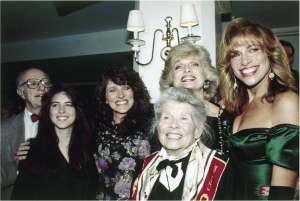Carly Simon's Loss And Education About Inherited Cancer Risk
- Musician Carly Simon’s sisters died one day apart, both tragically from cancer. Her brother Peter also perished from cancer.
- If you’ve had a family member who’s had cancer you’re at a higher risk and should be screened more closely, according to experts.
- Every cancer expert will inevitably tell you genetic testing also requires counseling so the information you use can be interpreted effectively.
Joanna Simon, 85, the eldest of the four Simon sisters, died of thyroid cancer, just one day before her sister Lucy, 82, who succumbed to metastatic breast cancer, according to Lucy's daughter, Julie Simon, who spoke to the Associated Press. Their brother Peter, a photographer, also died of cancer in 2018 at the age of 71.
Read More
Carly herself was diagnosed with breast cancer in 1998 at the age of 52. She underwent surgery and chemotherapy, according to the Chicago Tribune.
Assessing Your Risk For Breast Cancer
A noted expert Dr. Ophira Ginsburg, who is the senior scientific officer at the National Cancer Institute’s Center for Global Health, says “The real question of who is going to qualify for genetic testing is, to be honest, a moving target.”
“Nowadays, you can even self-refer and ask for testing. But we encourage only those who have a family history to really get that kind of service if you need it,” said Dr. Ginsburg.
If you do have this family history, Dr. Ginsburg recommends asking about your cancer center's hereditary cancer program and/or finding a genetic counselor through the National Society of Genetic Counselors (NSGC) to discuss what kind of genetic testing is right for you.
Should I Get Genetic Testing to Assess My Risk for Breast Cancer?
She recommends screening typically only for women who have a family history of rare cancers, or family members with breast or ovarian cancer and other cancers associated with the Lynch Syndrome (a genetic condition that puts you at high risk for certain cancers), or if there's a family history of common cancers diagnosed at a young age.
Should I Get Genetic Testing Done?
The short answer is ‘yes,’ if you have a close relative who inherited an increased cancer risk you may want to consider testing. But there are some things you should know before you go.
"If somebody in your family is found to have a genetic predisposition to cancer, whether it be breast cancer or any other type of cancer, the first step is to start testing relatives most closely related to you,” says Rachel Webster, a genetic counselor at MD Anderson Cancer Center. "Those relatives might be brothers, sisters, parents children. Those first degree relatives are the ones that are at the highest probability of having that same genetic predisposition."
Is Genetic Testing Right for You?
Webster also recommends meeting with a genetic counselor, because they will be able decide which type of genetic testing is best for you. And if you're worried about an invasive test, don't be.
"Genetic testing is probably the easiest test you have ever had in a cancer center. It is one tube of blood or a vial full of saliva," said Webster.
Webster explains that her job is to figure out what type of genetic testing may be most useful for the person she is meeting with and their family members. However, genetic counselors are not always easy to find.
For those who do not have access to a medical center or hospital that offers genetic counseling services, tele-health counseling may be available. If you're considering meeting with a genetic counselor and are unsure where to find one, the National Society of Genetic Counselors has resources on its website for locating a counselor.
Genetic Testing For Cancer
The world of medicine is becoming increasingly personalized for each patient, especially in breast cancer treatment. Physicians tend to look at genes to understand their patients’ breast cancers and guide treatment.
Genes, such as BRCA1 and BRCA2, are well-established predictors of breast cancer development, yet genetic tests, now more accessible to patients than ever, can assess dozens of genes. And with many genes lacking a clear association with breast cancer development, patients can end up with results that cause unnecessary stress without any counterbalancing benefits.
While identifying the BRCA1 and BRCA2 gene can tell a patient if they have an increased risk of developing breast cancer, these tests can now also identify many genes that do not have clear associations with breast cancer.
They are called variants of uncertain significance (VUS). Which are variants not clinically actionable, and these patients should be managed based on their individual risk factors, according to the American Society of Breast Surgeons (ASBrS). The qualification of VUS can cause significant stress for patients who do not know what to do after discovering that they carry one.
"Variants of unknown significance can cause some confusion," Dr. Julie R. Gralow, the Chief Medical Office and the Executive Vice President of the American Society of Clinical Oncology, tells SurvivorNet.
"But it doesn't mean that the testing should not have been done. It means that not enough families have been tested that have that variant, so it's not clear if cancer tracks with that change or not (this is more common in racial and ethnic minority populations, and in genes only rarely mutated and associated with cancer risk). It is important to be able to discuss why the results are "uncertain" in some instances, and how likely the abnormality is likely to result in increased cancer risk based on its location in the gene,” she said.
With assistance from Dr. Muneeb Niazi
Learn more about SurvivorNet's rigorous medical review process.


